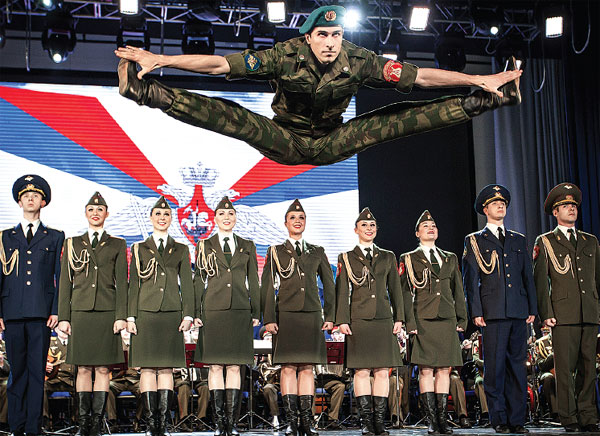An enduring relationship
By He Na (China Daily) Updated: 2015-01-05 07:50
|
The Alexander Red-Flag Song and Dance Troupe of the Russian Armed Forces performs at the Great Hall of the People in Beijing as part of a series of celebratory events to mark the 70th year since the end of World War II. Provided to China Daily |
The cultures of Russia and the Soviet Union have exerted a lifelong fascination on many older Chinese people, as He Na reports.
On Jan 1, The Alexander Red-Flag Song and Dance Troupe of the Russian Armed Forces performed at the Great Hall of the People in Beijing as part of a series of events to mark 70 years since the end of World War II.
The audience, middle-aged and gray-haired, joined in enthusiastically on classics such as Katyusha and Night on the Outskirts of Moscow, and wave after wave of applause and cheers echoed around the massive auditorium in scenes that would not have been out of place 50 years ago.
For many Chinese of a certain age, these old Russian and Soviet Union-era songs still have great appeal, because they remind them of a time when China and her northern neighbor stood hand in hand at the forefront of a changing world.
"I fell in love with Soviet and Russian literature in middle school, and read a great many novels and books of poetry in translation," Lu Jinhua, 68, a retired teacher from the Shijingshan District in Beijing, said.
Although more than five decades have passed since she first read them, masterpieces such as And Quiet Flows the Don and War and Peace are still two of Lu's favorite books. "I like the heroes and heroines in the novels because they are full of the courage to fight for freedom," she said.
Lu long harbored a desire to visit the Soviet Union, but it wasn't until 1995, four years after the dissolution of the USSR, that she and her husband got the opportunity to travel to Moscow.
The visit was a mixed blessing, both confirming and destroying the images conjured up by the books she had read. "The beautiful green fields and the white birches were just as quiet and pretty as the descriptions in the novels, but along the riverbank, instead of the peace and quiet of students reading, all we could hear was the bustle of hawkers selling food and gadgets," she said.
China's veteran revolutionaries were deeply influenced by Russian and Soviet culture, and the younger generation of Party leaders is still well-versed in the classics.
"When I was young I read the works of some of the masters, such as Alexander Pushkin, Mikhail Lermontov, and Anton Chekhov, and I definitely fell under the spell of Russian literature," said President Xi Jinping in a speech at the Moscow State Institute of International Relations in March 2013.
- Govt encourages people to work 4.5 days a week
- Action to be taken as HIV cases among students rise
- Debate grows over reproductive rights
- Country's first bishop ordained in 3 years
- China builds Tibetan Buddhism academy in Chengdu
- Authorities require reporting of HIV infections at schools
- Typhoon Soudelor kills 14 in East China
- Police crack down on overseas gambling site
- Debate over death penalty for child traffickers goes on
- Beijing to tighten mail security for war anniversary








